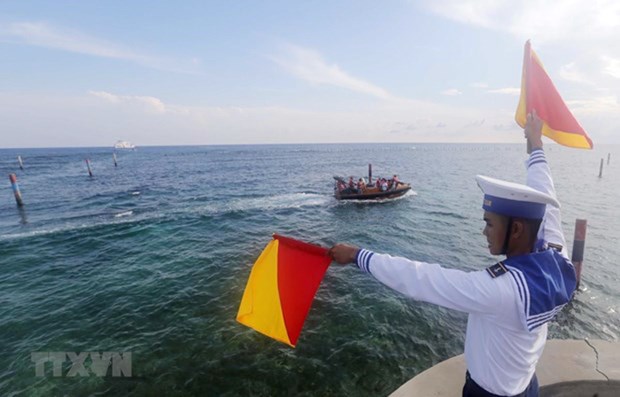Int'l community calls for law abidance in settling East Sea issue
The international community has continuously called on parties concerned to follow international practices and rules, especially the 1982 United Nations Convention on the Law of the Sea (UNCLOS) amid the complicated developments in the East Sea.
 |
| A Vietnamese naval soldier on Truong Sa (Photo: VNA) |
At the 31st meeting of States Parties to the UNCLOS in New York in late June, head of the Viet Nam Mission to the UN Ambassador Dang Dinh Quy stated that the East Sea is an important international sea route so that the maintenance of peace, security, stability, maritime safety and freedom holds significance to peace and development in the region and the world.
He reaffirmed Vietam’s stance that every dispute must be settled via peaceful means on the basis of respect to international law, including the UN Charter and the 1982 UNCLOS, as well as diplomatic and legal processes, without the use of force or threat to use force.
To ensure the law-abiding principle in the East Sea in the current context, parties concerned need to fully implement the Declaration on the Conduct of Parties in the East Sea (DOC) and soon reach a practical and efficient Code of Conduct in the East Sea (COC) in accordance with international law, including the 1982 UNCLOS, he said.
In a statement on July 12, Japanese Foreign Minister Toshimitsu Motegi said the Permanent Court of Arbitration (PCA)’s ruling five years ago is final and legally binding for the parties to the dispute under the provisions of the UNCLOS. He expressed strong opposition to unilateral attempts to change the status quo in the East Sea.
In a press statement on July 11, US Secretary of State Antony Blinken rejected China’s expansive maritime claims in the East Sea as having no basis in international law.
The international community has long benefited from the rules-based maritime order, where international law, as reflected in the 1982 UNCLOS, sets out the legal framework for all activities in the oceans and seas, he stated.
The international community has continuously called on parties concerned to follow international practices and rules, especially the 1982 United Nations Convention on the Law of the Sea (UNCLOS) amid the complicated developments in the East Sea.
At the 31st meeting of States Parties to the UNCLOS in New York in late June, head of the Vietnam Mission to the UN Ambassador Dang Dinh Quy stated that the East Sea is an important international sea route so that the maintenance of peace, security, stability, maritime safety and freedom holds significance to peace and development in the region and the world.
He reaffirmed Viet Nam’s stance that every dispute must be settled via peaceful means on the basis of respect to international law, including the UN Charter and the 1982 UNCLOS, as well as diplomatic and legal processes, without the use of force or threat to use force.
To ensure the law-abiding principle in the East Sea in the current context, parties concerned need to fully implement the Declaration on the Conduct of Parties in the East Sea (DOC) and soon reach a practical and efficient Code of Conduct in the East Sea (COC) in accordance with international law, including the 1982 UNCLOS, he said.
In a statement on July 12, Japanese Foreign Minister Toshimitsu Motegi said the Permanent Court of Arbitration (PCA)’s ruling five years ago is final and legally binding for the parties to the dispute under the provisions of the UNCLOS. He expressed strong opposition to unilateral attempts to change the status quo in the East Sea.
In a press statement on July 11, US Secretary of State Antony Blinken rejected China’s expansive maritime claims in the East Sea as having no basis in international law.
The international community has long benefited from the rules-based maritime order, where international law, as reflected in the 1982 UNCLOS, sets out the legal framework for all activities in the oceans and seas, he stated.
Source: VNA